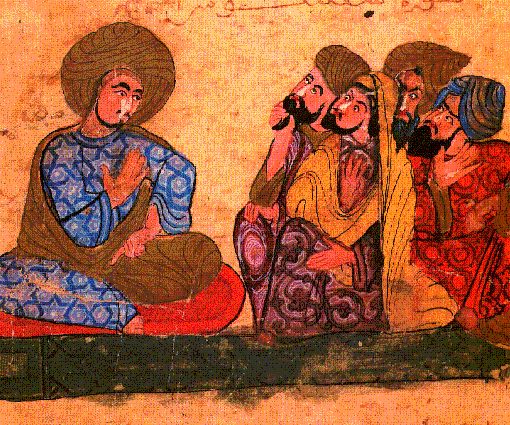Arabisk videnskab: En hyldest

Arabisk fremstilling af den græske filosof Sokrates og hans disciple.
Mange tror, at middelalderens arabiske videnskab kun var en bevarelse af status quo fra antikken eller afviser den ligefrem som værdiløs, og det på trods af dens bidrag til den europæiske renæssance og den herpå følgende videnskabelige og tekniske revolution.
Det er således ikke ualmindeligt at se folk, der ganske afgjort burde vide bedre udslynge "smarte" bemærkninger som f.eks. "de østlige religioner og kulturer har sandt for dyden ikke bidraget med meget andet end gold obskurantisme og virkningsløse 'alternative' behandlinger på det videnskabelige område" og lignende uinformeret sludder.
Den prisbelønnede fysiker Jim Al-Khalili forsøger i dagens Guardian at rette op på sådanne fordomme med en uforbeholden hyldest til den arabiske videnskab og den intellektuelle tradition, der stod bag den:
It has never been more timely or more resonant to explore the extent to which western cultural and scientific thought is indebted to the work, a thousand years ago, of Arab and Muslim thinkers.Den europæiske videnskab ville, med andre ord, intet have været uden den arabiske, hvilket visse mennesker måske gør klogt i at huske, før de gør for meget ud af "østlige kulturers" generelle værdiløshed og overtro.
What is remarkable, for instance, is that for over 700 years the international language of science was Arabic (which is why I describe it as "Arabic science"). More surprising, maybe, is the fact that one of the most fertile periods of scholarship and scientific progress in history would not have taken place without the spread of Islam across the Middle East, Persia, north Africa and Spain.I have no religious or political axe to grind. As the son of a Protestant Christian mother and a Shia Muslim father, I have nevertheless ended up without a religious bone in my body.
If there is anything I truly believe, it is that progress through reason and rationality is a good thing - knowledge and enlightenment are always better than ignorance. I proudly share my worldview with one of the greatest rulers the Islamic world has ever seen: the ninth-century Abbasid caliph of Baghdad, Abu Ja'far Abdullah al-Ma'mun. Many in the west will know something of Ma'mun's more illustrious father, Harun al-Rashid, the caliph who is a central character in so many of the stories of the Arabian Nights. But it was Ma'mun, who came to power in AD813, who was to truly launch the golden age of Arabic science. His lifelong thirst for knowledge was such an obsession that he was to create in Baghdad the greatest centre of learning the world has ever seen, known throughout history simply as Bayt al-Hikma: the House of Wisdom.
The scientists and philosophers whom Ma'mun brought together, and whom he entrusted with his dreams of scholarship and wisdom, sparked a period of scientific achievement that was just as important as the Greeks or Renaissance, and we cannot simply project the European dark ages on to the rest of the world.
Many of the achievements of Arabic science often come as a surprise. For instance, while no one can doubt the genius of Copernicus and his heliocentric model of the solar system in heralding the age of modern astronomy, it is not commonly known that he relied on work carried out by Arab astronomers many centuries earlier. Many of his diagrams and calculations were taken from manuscripts of the 14th-century Syrian astronomer Ibn al-Shatir. Why is he never mentioned in our textbooks? Likewise, we are taught that English physician William Harvey was the first to correctly describe blood circulation in 1616. He was not. The first to give the correct description was the 13th-century Andalucian physician Ibn al-Nafees.
And we are reliably informed at school that Newton is the undisputed father of modern optics. School science books abound with his famous experiments with lenses and prisms, his study of the nature of light and its reflection, and the refraction and decomposition of light into the colours of the rainbow. But Newton stood on the shoulders of a giant who lived 700 years earlier. For without doubt one of the greatest of the Abbasid scientists was the Iraqi Ibn al-Haytham (born in AD965), who is regarded as the world's first physicist and as the father of the modern scientific method - long before Renaissance scholars such as Bacon and Descartes.
But what surprises many even more is that a ninth-century Iraqi zoologist by the name of al-Jahith developed a rudimentary theory of natural selection a thousand years before Darwin. In his Book of Animals, Jahith speculates on how environmental factors can affect the characteristics of species, forcing them to adapt and then pass on those new traits to future generations ...
Link - til almindelig opbyggelse.
